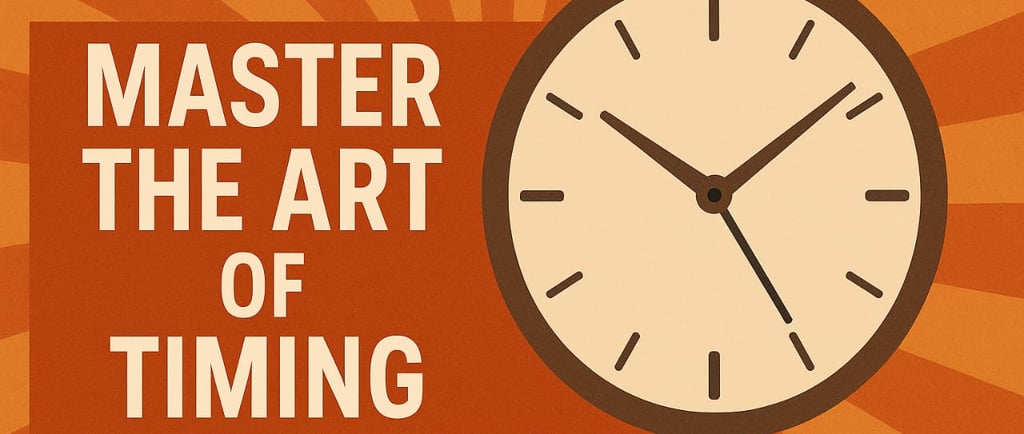Master the Art of Timing: The Hidden Secret to Success in Life and Work.
Discover how mastering the art of timing can transform your life, decisions, and success. This blog explores powerful strategies to improve your sense of timing in career, relationships, and personal growth. Learn when to act, pause, or wait — and why perfect timing often makes the difference between failure and greatness.
SELF-IMPROVEMENT


Never seem to be in a hurry; hurrying reveals a lack of mastery over both yourself and your time. Always appear patient, as if you possess the confidence that everything you desire will eventually come to you in due course. Become a detective of the present moment: sift through the spirit of the times and identify the prevailing trends that will propel you to power. Learn to step back when the moment isn’t ripe, and strike with fierce determination when the time has come for action.
Starting his journey in life as a nondescript teacher at a French seminary, Joseph Fouche spent much of the 1780s traveling from town to town, imparting knowledge of mathematics to young boys. However, he never fully surrendered to the religious life; he refrained from taking holy vows, for he harbored grander ambitions. Patiently, he bided his time, keeping his options open, and when the French Revolution erupted in 1789, Fouche seized the opportunity. He renounced his clerical garb, grew his hair long, and emerged as a fervent revolutionary, perfectly in tune with the zeitgeist. Missing this pivotal moment could have spelled disaster for him, but Fouche was astute—he did not miss the boat.
By cultivating friendships with influential revolutionary leaders such as Maximilien Robespierre, he quickly ascended the ranks of the revolutionary movement. In 1792, he was elected by the citizens of Nantes to represent them at the National Convention, which had been convened that year to draft a new constitution for a fledgling French Republic.
Upon his arrival in Paris, a violent schism had emerged between the moderates and the more radical Jacobins. Fouche with a shrewd understanding of the political landscape, sensed that neither faction would ultimately triumph. History showed that true power seldom rests with the revolutionaries or their enthusiastic supporters; it instead clings to those who can navigate the eventual outcome of the tumult. This realization guided Fouche next moves.
He initially aligned himself with the moderates, knowing they held the majority. However, as the call for the execution of King Louis XVI grew louder, he recognized the shift in public sentiment and boldly cast the deciding vote in favor of the guillotine. This turned him into a radical overnight. Yet, as the atmosphere in Paris grew increasingly charged, he prudently distanced himself from any faction to avoid being ensnared in the political infighting. He accepted an assignment in the provinces, where he could maintain a lower profile.
Later, he was appointed proconsul in Lyons, where he oversaw the execution of numerous aristocrats. However, sensing a change in public sentiment, Fouche made the crucial decision to halt the killings, thereby positioning himself as a savior in the eyes of the citizens who were weary of the bloodshed that became synonymous with the Reign of Terror.
Fouche strategic acumen continued to show promise, but in 1794, as tensions mounted, he was summoned back to Paris by his once-close ally, Robespierre. The leader of the Terror had grown suspicious of Fouche ambitions, and the specter of execution loomed large over him. In the ensuing weeks, a tense game of cat and mouse unfolded between the two. While Robespierre made public accusations against Fouche, labeling him a dangerous rival, Fouche operated behind the scenes, tending to his network of supporters among those who were beginning to weary of Robespierre’s authoritarian rule.
Fouche understood the importance of timing; he gathered support from both moderates and Jacobins, appealing to their collective fear of becoming the next victims of the guillotine. This careful orchestration culminated on July 27, when the Convention turned against Robespierre, drowning out his lengthy oration with chaotic shouts. He was swiftly arrested, and mere days later, it was Robespierre’s own head that fell into the execution basket.
Upon returning to the Convention after Robespierre's downfall, Fouche made a bold, unexpected move. Despite having led the charge against Robespierre, he chose to align himself with the radical Jacobins, a significant shift considering he was now among the minority. His intuition told him that a backlash was brewing; the moderate factions, having orchestrated Robespierre’s execution, were likely gearing up for another wave of terror—this time targeting the radicals. By siding with the Jacobins, Fouche positioned himself alongside those who would be viewed sympathetically in the turbulent times to come.
Taking a gamble by associating himself with a losing side posed risks, yet Fouche calculated that he could withstand the political tides long enough to rally public sentiment against the moderates and ultimately watch them falter. Though he was targeted for arrest in December of 1795, the public’s sentiment had shifted. Executions had become increasingly unpopular, and Fouche narrowly evaded the guillotine once again, demonstrating his remarkable ability to adapt and survive amidst the chaos of revolution.
